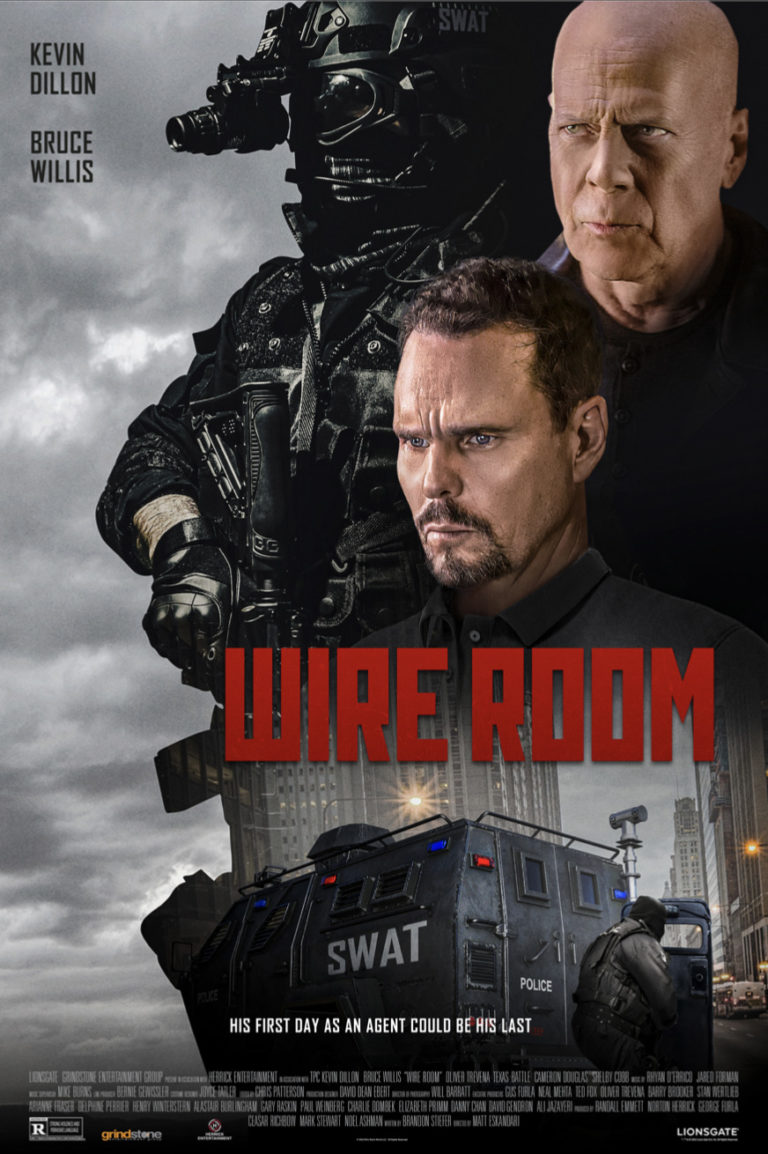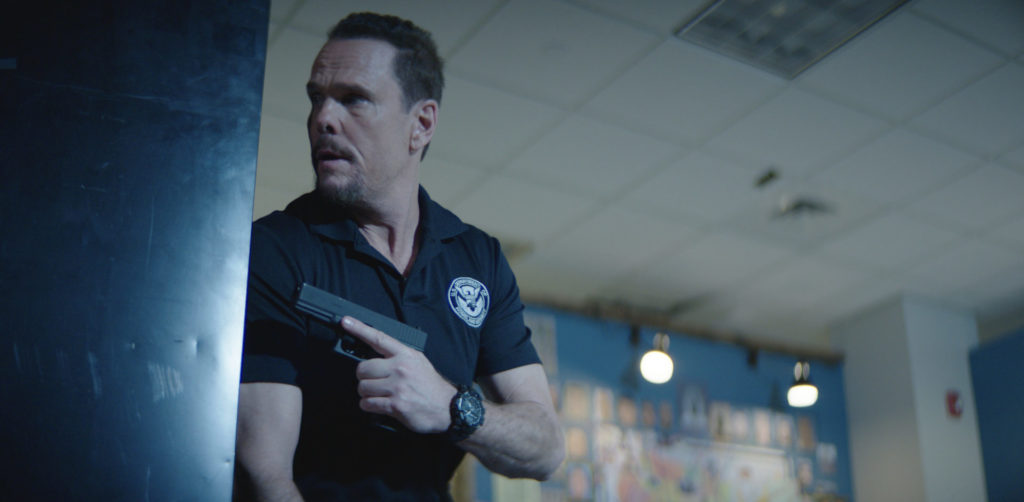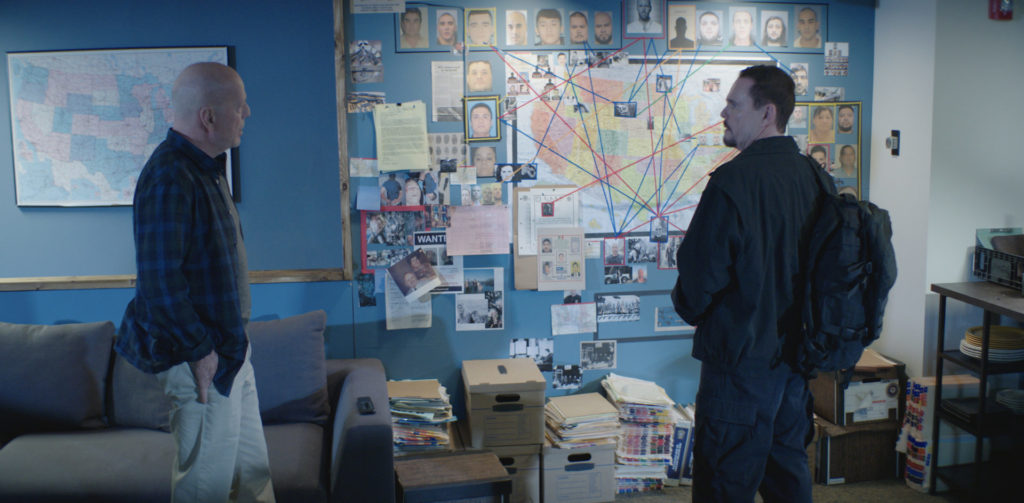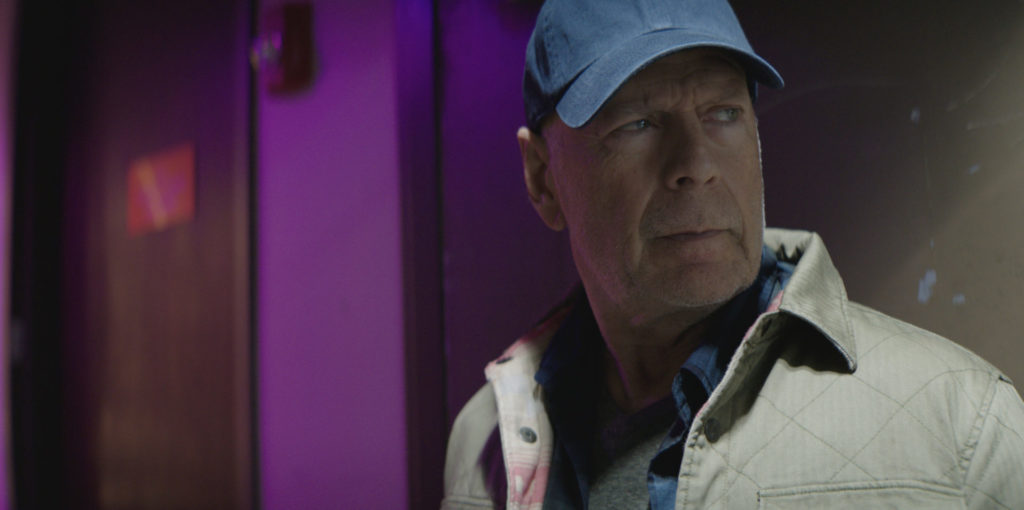

Exclusive Interview with director Matt Eskandari
Q: I heard that writer Brandon [Stiefer],used to work in [the Department of] Homeland Security. How much did his input help you make this film? What things did you find fascinating about Homeland Security?
ME: That’s actually true that the writer used to work at Homeland Security, so he has a lot of real-life experience in the wire room. That really gave the story and the script a lot of authenticity and made it feel real and genuine. That, honestly, was one of the things that made me want to direct the movie.
Q: What fascinated you about Homeland Security itself?
ME: Obviously, it’s this whole idea that Homeland Security is able to surveil, listen and watch people while [they] don’t know about it. I don’t know if I like the idea, but it’s an interesting hook for a story.
One thing about the script that really drew me in was the character chemistry between Justin and Eddie, and the way that, over the course of the 90 minutes, they start off. They don’t know each other or share an actual scene together where they’re in the room together. But you see them slowly go from animosity to trust to respect, and you see them rooting for each other by the end. I thought that was a cool character dynamic which I hadn’t personally done a movie on before. So that was really something that drew me in.
Q: You made “12 Feet Deep” with two sisters trapped under a fiberglass cover in an Olympic-size swimming pool. In this film you also have a very small, confined space to shoot in. How did you map it out in order to engage the audience so they feel the tension?
ME: It’s funny. It’s not by choice, but for some reason in my career I’ve been doing thrillers. “12 Feet Deep” was a difficult film to shoot for sure because it was in the water for 90 minutes. That’s way more challenging.
But this? Obviously going into this, I knew that it would have its constraints and I needed to really pull in my experience as a filmmaker and make it as cinematic as possible. A lot of that comes down to finding the right angles, finding some cinematic angles, keeping the camera moving, the right kind of lenses — anamorphic ones.
Then, I work with the actors so that the blocking in the scenes really uses as much of the space as possible. Instead of Kevin just sitting at the monitor for 90 minutes, he gets up, runs around, and grabs things. He does a lot of movement within the space so that the audience is constantly seeing that visual variety and makes it feel bigger and more cinematic.

Q: You’ve worked with Bruce Willis on “Trauma Center,” “Survive the Night,” and “Hard Kill” and now this will be the fourth film you’ve done with him. How did your relationship develop over the course of those four films?
ME: Yeah, it’s been a pleasure. It’s one of those things that, if you had told me 10 years ago when I was in film school that, “You’ll be directing four movies with Bruce Willis in 10 years.” I’d be like, “Whaat? That’s crazy, man.” But it’s just one of those things.
I had this script that I took to Lionsgate. They liked it a lot, and attached Bruce to it. I got to work with him on the “Trauma Center” and it was a great experience. Working with somebody at that level, you see why he’s a legend. He’s an A-list star because every time he’s on camera there’s something behind the eyes — there’s depth there. You’re just drawn to him, I don’t know what it is — that magic movie star quality that some actors have.
So, it’s been a pleasure, it’s been cool. Every movie that I did with him was different, which I thought was interesting. I never made the same movie with him twice, there was always something different. [First] it was this detective thriller in a hospital, and then a home invasion where he plays a grandfather — which is my personal favorite. And then [we” did] Hard Kill” which was this heist movie. And now, it’s this wire room surveillance story.
That’s what’s been cool, to be able to put him in these different films and see him play very different characters.
Q: What conversations did you have with the actors to make the action scenes seem so real?
ME: I love working with real effects, explosions and fights as much as possible, choreographed well. For me it’s about how much can we do in-camera? And how much can I get the actors to really be there on the moment, in the day?
A lot of it is that I talk with the actors. I let them know, “Hey, are you open to doing as many of the stunts as you can? We’ll get you the training, we’ll teach you how to use guns and fight.” A lot of times, they’re gung-ho for it — they have fun too. They’re actors for a reason. They want to get in there, get gritty and dirty and bruised up a little bit.
It’s a lot of fun, and I feel like it gives the films a little more grittiness rather than making it all [CGI].
Q: The relationship between Justin [Kevin Dillon] and Shane [Bruce Willis] [is at the film’s core]. Justin is the rookie coming in and wants some action. Shane is about to retire and wants to leave quietly. It has an interesting, wonderful dynamic. How did you create that and make [it an intriguing] relationship in the beginning, and in the end, that it works out well?
ME: That was on the page, thankfully. The writer, when he wrote the script, he really nailed that relationship between Shane and Justin. How one of them is just this rookie, he’s excited, he came here to get some action. And then we have Shane, who’s burnt out and he’s done, he’s tired, he doesn’t want to deal with the wire room anymore. He’s probably done it for 20 years and nothing exciting ever happens for him.
It was a funny dynamic, and I thought it was third- or fourth-wall-breaking in a way. But it was cool to see that dynamic. To me, it was funny because Kevin, who’s playing [Justin], is trying to get the approval of Shane, and [Bruce] is just blowing him off. [Justin is] like, “What, man? Come on, help me off here.” And [Shane] just blows him off. I thought that was funny.

Q: Even though this is mostly an action film, there are some comedic elements in it. Was there any improv with Kevin? How did you work with him on the set?
ME: Kevin is obviously a talented actor. He has great ad-lib comedic skills, so that definitely was one of the things that I told him when we cast him in the role. I said, “Hey Kevin, any time you find a little funny moment where you can ad-lib, or play with a little line, or throw a look or just do something, do it. We’ll have fun with it. It’s either going to work or it’s not. Seven out of 10 times, it might not. But those three times that it does, it’ll be funny. It’ll be comedic gold.”
There were a lot of those little moments that he just threw stuff in there. I don’t know if you remember, but at the end of the movie, that whole little thing about “There’s no parking here.” That was just Kevin ad-libbing something about never finding somewhere to park. It was just him doing funny stuff. I thought that was definitely something intentional that we wanted to bring into the story.
Q: This film was shot during Covid and there was a lot of confined space in shooting. How did you work with the circumstances of Covid?
ME: Obviously this was my first time shooting with the Covid restrictions, and it definitely was not easy. You’re dealing with masks, quarantining, and everybody has to get Covid-tested. That’s a time-waster. But ultimately, it’s just to keep everybody safe, and we found ways to work around that. Hopefully, very soon in the future, we can all put this behind us and move on, and just go back to shooting movies the normal way. I’m optimistic.
Q: Oliver Trevena — as Eddie Flynn — gave an amazing performance. He’d was on set and interacted with Kevin on the phone even though they were in different places. What was involved in the casting process and performance?
ME: I feel like Oliver’s casting was a stroke of genius because, in the script, the character was written as a Mexican cartel boss. I felt like we’ve seen that character so many times before, I thought it was interesting to cast something completely different.
Oliver is actually the one that came to me and said, “What if he is an Irish arms dealer?” and I was like, “Whoa that’s interesting. Can you do an Irish accent?” and he’s like, “I can do it.” So he basically crafted that character from scratch. He was watching videos with Conor MacGregor, you know, he has that style and swagger — he was trying to bring some of that swagger to the character. He’s one of those actors who wanted to embody that role as much as he could. He was choosing exactly what he was going to wear, how he was going to walk, and all that stuff. So it was really fun to create that character with him.
And even though he never shares a scene in the actual room with Kevin’s character — with Justin — he was like, “okay, I’m going to come on set and read the lines off camera with him, just to give him something to work with and I’ll know how he’s playing it.” I thought that was a great idea. It helped them both develop that chemistry throughout the story that is critical for it to work.

Q: Justin seems to have a history of why he was working in the Secret Service. Later on, it was revealed by Shane talking about his past. Was it a conscious choice to not get into the details because you just wanted to focus on this wire room story?
ME: There was more on the page, and I was battling how much we wanted to delve into that. It’s just one of those things that you make a choice in the editing room when you’re making a movie and you’re saying “Okay, we have 90 minutes to tell this story. What do we want to focus on and what don’t we?”
It’s something intriguing to me about just leaving the bread crumbs there for the audience, and giving them enough to be like, “Oh, this guy’s got a history, he’s got a past. Obviously, there’s something that happened and there’s more to this story. There’s something that’s obviously motivating him. What is it?” There’s an ambiguity to it. That was definitely an intention to give him something there, but at the same time leave it to the audience to fill in that blank for themselves. Maybe if there’s a sequel, we’ll be able to tell that story.
Q: What other challenging things did you tackle on the set?
ME: I feel like in every movie there are different challenges, things that you have to tackle. For this one we had a really tight schedule, we didn’t have a lot of days [or] time for a lot of prep. I was going into it with a tough challenge to make this movie working with very little time.
And then there’s the whole idea of the limited location, and trying to make that feel cinematic and visually interesting. That’s always a tough challenge for a filmmaker. The last movie I did was “Hard Kill” and that one felt like it had a lot more production value. It wasn’t just a guy in a room, there was a lot of stuff happening.
So to go from that to, “Okay, now I’m going to intentionally limit my production values. Yet how am I still going to make this intriguing for the audience? How do I keep them engaged for 90 minutes? How do I give them just enough to keep them on edge, but at the same time, wanting more?”
It was definitely like every movie. It offered tough challenges for me as a director. Hopefully we were able to conquer them.
Q: What do you want the audience to take away from this very interesting film?
ME: It’s one of those things where as a director, I don’t ever want to beat the audience over the head with a message or anything. I want them to have fun, be entertained, enjoy the experience, and take away a few things. The importance of getting exposed to this interesting world of the wire room and to know about what the government can do — that it has this kind of control [raises] interesting questions to ask. And to [get someone to] say, “Whoa, is this real? What are these things going on like this? Do these things exist?” I feel like as long as they can walk away with that, [and be] entertained, then I did my job.
Check out more of Nobuhiro’s articles.
Here’s the trailer of the film.

